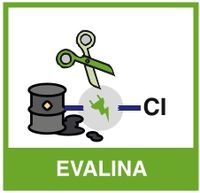EVALINA Electrochemical valorization of highly chlorinated persistent waste |
Large quantities of polychlorinated organic production residues from the production of the now obsolete highly chlorinated pesticides were dumped worldwide. This corresponded to the disposal standard at the time. These compounds are very stable and are hardly degraded by microbial and other degradation pathways. According to the latest state of development, high-temperature incineration processes are now used to dispose of these residues. The safe incineration of old landfill residues is energy-intensive and generates very high disposal costs. It is therefore necessary to develop more efficient and, above all, more sustainable degradation methods for the safe disposal of these persistent compounds.
Initial investigations have shown that the electrochemical process for treating highly chlorinated organic compounds (e.g. the isomers of hexachlorocyclohexane (HCH) from landfill sites) represents a new sustainable option for the safe, value-adding and also more cost-effective degradation of this waste.
The aim of the EVALINA consortium is to convert HCH residues from landfills into reusable building blocks for technical syntheses. The promising process used for this is the cathodic dehalogenation (reductive splitting of chlorine compounds) of HCH. This can be carried out under very mild conditions using an inexpensive graphite electrode. The aromatic molecule benzene is formed from the cyclohexane base, which can be further utilized as a useful raw material in organic synthesis. This new electrochemical approach to the degradation of chlorinated organic compounds can thus replace the use of fossil-derived basic chemicals for subsequent syntheses. The chlorides released from the HCH can be added directly to unsaturated hydrocarbons in the same electrochemical reaction to create access to synthetically valuable dihalides or can also be converted into versatile chlorine gas.
The close cooperation between the Max Planck Institute For Chemical Conversion, ESy-Labs GmbH and the science and technology company Merck enables the efficient upscaling of HCH electrolysis to be further investigated and its implementation evaluated. To implement the developed method, a mobile pilot plant is planned to bring the electrolysis to the location of the HCH deposits and thus enable the upcycling of HCH into valuable products.
Coordinator:
Siegfried R. Waldvogel (MPI CEC) siegfried.waldvogel@cec.mpg.de
Tobias Gärtner (ESy-Labs) info@esy-labs.de

